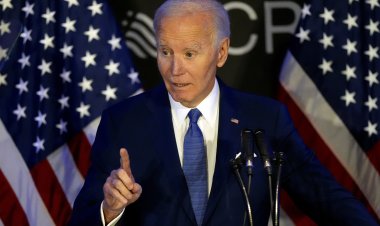Trump Returns with a Broad Agenda, a Mandate, and a Score to Settle
Donald Trump returns to office, supported by a more inclusive GOP coalition and an intensified emphasis on loyalty.

The initial actions by Trump indicate that the personal vindication he feels as he returns to Washington has not transformed him into a conventional politician. Instead, he seems more emboldened, demanding loyalty more than ever, and is intent on enacting revenge against his political adversaries, particularly those who tried to hold him accountable. His policy initiatives have expanded dramatically, featuring mass deportations, sweeping tariffs, and a notably aggressive foreign policy strategy that might involve military interventions in regions like Greenland and Panama.
As Inauguration Day approaches, Trump's friends and allies agree that not only has the nation shifted since his previous term, but he has also undergone some changes. He returns to the presidency with greater confidence in his abilities and a heightened awareness of Washington politics and protocols, despite his unrestrained personal instincts.
Supporting him is the most extensive and diverse GOP coalition in recent history, composed of not only steadfast supporters and MAGA enthusiasts but also Wall Street leaders, corporate representatives, tech entrepreneurs, social conservatives, and a considerable number of working-class and union voters who traditionally aligned with the Democratic Party.
Trump is reinforced by a cadre of like-minded Cabinet members and political appointees who not only support but enthusiastically advocate for the MAGA movement, aiming to eliminate any "deep state" opposition within the federal apparatus. They have generally expressed personal loyalty to Trump and have stood behind his unfounded claims of winning the 2020 election.
“He understands the office. He understands government better. He has complete trust in folks around him,” said Trump fundraiser and lobbyist Brian Ballard. “Eight years ago when he came in, he didn’t get the traditional, ‘Let’s give this guy a chance.’ I was at the inaugural, and the day after, there were a million people protesting against him.”
Now, “he has a governing mandate, and I think it’s going to show,” Ballard added.
In many respects, Monday also serves as the climax of the narrative that began when Trump rejected the 2020 election results, inspiring a siege on the Capitol by his supporters. Yet, after four years of economic struggles and attributing their difficulties to Joe Biden's presidency, voters returned to Trump in greater numbers than during his initial campaign. This morning, his supporters will be allowed into the Capitol — a stark contrast to four years ago, made possible by the cold weather.
Trump will be sworn into office inside the Capitol Rotunda rather than outdoors on the West front, a unique change influenced by similarly inclement weather conditions that led to Ronald Reagan foregoing an outdoor inauguration in 1985.
Inauguration Day will commence for Trump with a service at St. John’s Episcopal Church, a typical ritual for incoming presidents. He and incoming first lady Melania Trump will proceed from there to a tea with President Joe Biden and first lady Jill Biden, another Inauguration Day custom, before heading to the Capitol for the ceremony.
He is expected to take the oath of office around noon and deliver his second inaugural address, crafted with the assistance of senior aides Vince Haley, Stephen Miller, and Ross Worthington.
Trump has vowed to hit the ground running. In a recent interview with NBC News, he highlighted his immediate plans, which include initiating mass deportations, visiting areas in Los Angeles affected by devastating wildfires, and signing a “record-setting” number of executive orders soon after his address.
For nearly half the nation, Trump’s reentry into the White House represents a troubling moment in American history, fearing the rise of a leader they believe will erode democracy and weaponize the presidency against political rivals. Conversely, for others, it signifies a hopeful, albeit nationalistic, call for change and a necessary reevaluation of policies they perceive as having failed ordinary Americans, particularly regarding border security and extensive regulations on various sectors.
Americans “lived through the end of Trump, and they lived through four years of Biden and Harris, and most Republicans came flocking back to Trump, and they weren’t willing to let one issue or one bad day get in the way of what they knew was a clear choice,” stated Scott Jennings, a GOP strategist considered for the White House press secretary position. “The throughline for a lot of Republicans is basically Donald Trump’s going to defend Western civilization.”
Trump's return to Washington carries significant historical weight; he not only won the popular vote — a feat unattained by any Republican president for two decades — but he is also set to become only the second president to resume office after losing a prior election, following Grover Cleveland. Additionally, he is the oldest individual ever elected president, emerging from a campaign cycle rife with queries regarding Biden’s age and mental fitness, ultimately leading to Biden's withdrawal and Kamala Harris assuming the Democratic nomination five months before the election.
Notably, Trump is the first president to assume office both as a convicted felon and after being convicted of falsifying business records in a case involving a payout to Stormy Daniels, a porn star who alleged a sexual encounter with him. Earlier this month, he received an "unconditional discharge," meaning no further penalties; this victory has also postponed additional criminal trials, including those linked to attempts to overturn the 2020 election and allegations of stockpiling classified documents.
Despite the deep cultural and political divides in the nation, the current landscape features little in the way of “resistance.” Neither traditional Republicans nor Democrats — nor corporate America — appear committed to challenging Trump significantly.
The Republican-controlled Senate has publicly asserted its intent to carry out its advice-and-consent responsibilities seriously, yet it has shown a willingness to accommodate even Trump’s most controversial Cabinet picks, who are markedly more aligned with him than his first-term selections.
These nominees include the scandal-ridden Defense secretary candidate Pete Hegseth, former politician and vaccine skeptic Robert F. Kennedy Jr. as Health and Human Services secretary, and ex-Rep. Tulsi Gabbard as national intelligence director, who has encountered difficulties in her discussions with senators during her nomination process.
Trump has also cultivated relationships with Capitol Hill leaders that were nonexistent when he first emerged as a controversial candidate who met suspicion — and sometimes outright hostility — from the GOP establishment. In doing so, he has reshaped the party to the extent that allegiance to Trump is increasingly viewed as a prerequisite for membership.
Longtime Trump pollster and adviser Jim McLaughlin remarked that during Trump’s initial election, a mere “a half-dozen or eight people” expressed interest in positions within the administration.
“This time, I’ve heard from over 100 people that want jobs, want to get into the administration. People I haven’t heard from in 20 years,” he noted.
Establishment Republicans are now questioning their relevance within the party. Figures once hopeful of tempering Trump, like former Rep. Liz Cheney, former Vice President Mike Pence, and longtime Senate leader Mitch McConnell, have been sidelined or even worse.
Trump has pledged to target a long list of political adversaries who, like Cheney, challenged his claims of election fraud or opposed his reelection efforts, including prosecutor Jack Smith, who has taken him to court.
“The party had the choice of which direction it wanted to pick and I think it pretty well spoke,” asserted Heath Mayo, a conservative activist and founder of the advocacy group Principles First. “The Nikki Haleys of the world, the Mike Pences, the folks who have remained dedicated to conservative principles as opposed to just the personality fest have been pushed aside and the party has really said what it wants to be, which is an isolationist, personality-driven party.”
“They are in that spiral and there is nothing that is going to break them out of that feedback loop that they’re in,” he added.
Corporate America has noticeably shifted, seeking a relationship with Trump at Mar-a-Lago despite having previously marginalized him during his term in office. The contributions to Trump’s inaugural committee, an allied super PAC, and a 501(c)(4) group supporting the incoming administration are expected to reach up to $250 million, mainly from major players in the tech, automotive, banking, healthcare, and fossil fuel sectors.
“Corporate America has just flipped. It’s pretty shocking how servile they all are. They wanted to kill Trump,” remarked Steve Bannon, a former Trump strategist and host of the War Room podcast. “The guys coming down to Mar-a-Lago — it’s even more shocking in real life. They’re obsequious. They’re just waiting like little kids to see him. It shouldn’t shock me, but it does. Everybody fears him now.”
Meanwhile, while Democrats steadfastly oppose the Trump agenda, their resistance appears increasingly feeble. Following their disappointing performance in the November elections, there is a widespread acknowledgment within the party that the Democratic leadership must comprehend why they lost out not just in the electoral but also in the popular vote.
Nonetheless, Sen. Richard Blumenthal stated in an interview that his party is “undaunted” and “determined.”
“We have a job to do and we’re working on doing it,” he said, without providing specific details.
Allies of Trump acknowledge that despite their conviction as the new administration begins, the presidency and Trump's popularity may quickly shift. Trump has promised to resolve complex issues such as inflation, conflicts, and immigration almost instantly, which might prove to be an unreasonable expectation.
“We got less than two years,” said a close Trump adviser, relaying the urgency he has shared with the president’s team. “People have to start feeling it.”
Ben Leonard contributed to this report.
Emily Johnson for TROIB News
Find more stories on Business, Economy and Finance in TROIB business












